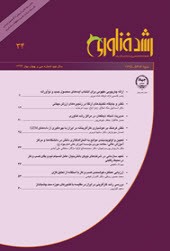تعیین و اولویت بندی موانع به اشتراک گذاری دانش در دانشگاه ها و مراکز آموزش عالی مطالعه موردي مؤسسه آموزش عالي امام جواد (ع)
محورهای موضوعی : زيرساختهاي توسعه فناوري و نهادهاي پشتيبان توسعه فناوريداریوش پورسراجیان 1 , مژگان سلطانی علی آبادی 2 , محمدصالح اولیاء 3
1 - -
2 - -
3 - مهندسي صنايع
کلید واژه: دانش, مديريت دانش, به اشتراکگذاري دانش, تسهيم دانش, موانع به اشتراکگذاري دانش, دانشگاهها و مراکز آموزش عالی.,
چکیده مقاله :
هدف از مطالعه حاضر بررسی و شناسایی موانع به اشتراکگذاری دانش در یک مؤسسه آموزش عالی به عنوان یکی از قدمهای اساسی در پیادهسازی فرایند مدیریت دانش در دانشگاهها و مراکز آموزش عالی ميباشد. از یک سو، آموزش عالي محور توسعه و تحول در جوامع مختلف و كانون اصلي تربيت نيروي انساني متخصص و آموزش ديده کشور بوده و بنابراين تحقق مديريت دانش، در این حوزه از الزامات اساسی و ابزار قدرتمند توسعه جامعه دانشمحور به عنوان یکی از ارکان چشمانداز کلان کشور محسوب ميگردد. از سوی دیگر، با تغییر شعار "دانش قدرت است"، به شعار " اشتراکگذاری دانش قدرت" است، اشتراکگذاري دانش و توسعه آن در سازمان و همچنین در بین سازمانها و سیستمهای گوناگون به فرایند محوری و جهتگیری اصلی سازمانها در مديريت دانش تبدیل شده است. لذا ایجاد یک دید جامع در خصوص چالشها و موانع به اشتراکگذاري و شناخت مناسب از تسهیل کنندههای آن در دانشگاهها و مراکز آموزش عالی به عنوان پیش نیازی در رسیدن به اهداف مدیریت دانش در حوزه آموزش عالی کشور مد نظر ضروری مينماید. در این راستا این مقاله با شناسایی 29 عامل کلیدی مؤثر در فرایند به اشتراکگذاري دانش در سازمانها و دستهبندی آنها در قالب 5 حوزه منابع انسانی، فرهنگ سازمانی، ساختار، سیستم و فناوری و راهبردهای رهبری، به عنوان نمونه صحت روابط بین عوامل اصلی و وزن (اولویت) هر یک از عوامل مذکور در حوزههای 5 گانه را در مؤسسه آموزش عالی امام جواد (ع) یزد ارائه نموده است.
The aim of this study is to investigate and identify the barriers to knowledge sharing at a high education institute as one of the necessary steps in implementation of the process of knowledge management at universities and HEIs. On the one hand, higher education is the base of development and the main focus of human recourses enrichment in societies, Therefore implementation of knowledge management in this field is one of the basic requirements and a powerful tool for improving knowledge-based societyS as one of the elements of country’s development vision. On the other hand, by changing the slogan “knowledge is power” to “knowledge sharing is power”, knowledge sharing and extending it in organizations, between organizations and different systems has become the main process and orientation inside organizations concerning knowledge management. Therefore creating a comprehensive vision concerning the challenges and barriers of knowledge sharing and a proper understanding of its facilitators in HEIs and universities seems necessary as a pre-requisite in reaching the goals of knowledge management in the field of higher education in the country. In this regard, 29 key factors in knowledge sharing process inside organizations in 5 main categories of human resources, organizational culture, structure, systems and technology and leadership strategies have been determined and as a case study, relationships between main factors and priority of each of the mentioned factors in 5 categories have been presented at Imam Javad University College.


